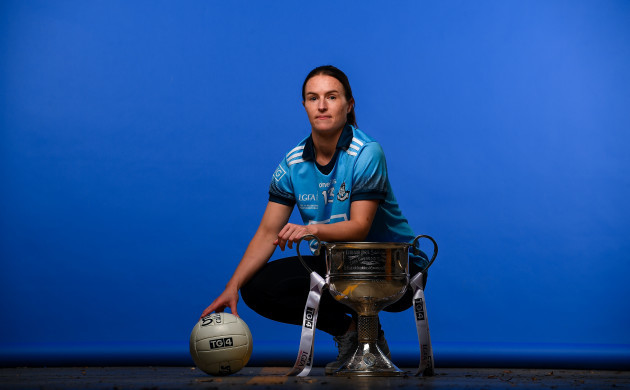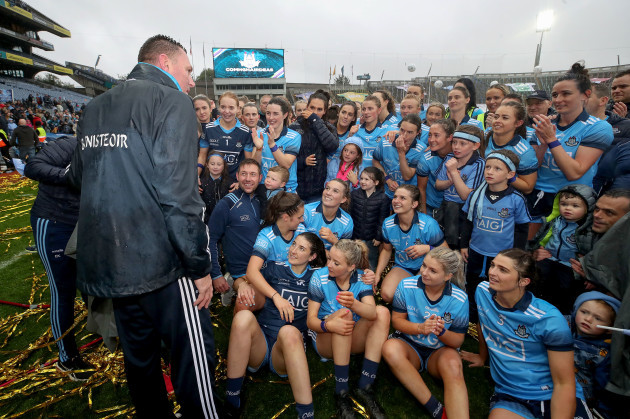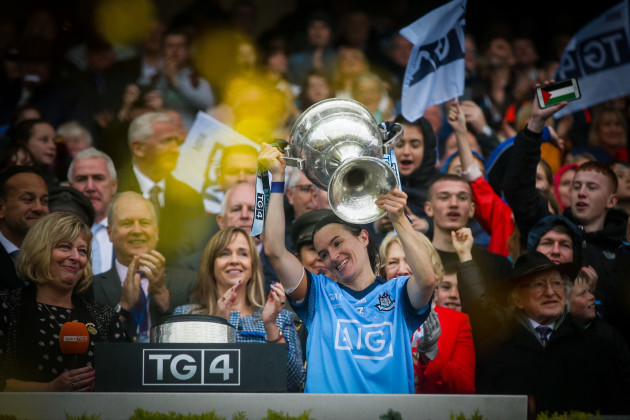DUBLIN CAPTAIN SINÉAD Aherne has heightened calls for ladies footballers and camogie players to receive travel expenses.
It’s an issue that has been raised plenty through the years but with players expected to travel alone during the Covid-19 crisis, they’re obviously left further out of pocket.
Mick Bohan highlighted the situation this week as the 20×20 movement wrapped up its two-year campaign to achieve a 20% increase in participation, attendance, and media coverage for female athletes.
“We went after fairness rather than equality,” the three-time All-Ireland winning boss explained, while underlining the grave disparity in travel expenses, in a breakout session with former Irish hockey coach Graham Shaw.
“That’s in Dublin. Imagine the rest of the country,” former Mayo midfielder Fiona McHale wrote on Twitter afterwards, while Gemma Begley, the ex-Tyrone star who currently sits on the Women’s Gaelic Players Association [WGPA] executive added:
Only 7% of female county players get any travel expenses.
Covid guidelines -> all must travel individually.
26% unable / cant afford to do so.
Avg journey of 50mile x 3 sessions / wk.
0 financial support for female players.
Let’s do better.”
And it’s something Aherne spoke at length about when asked by The42 for her thoughts on Bohan highlighting the issue, which he insisted players don’t complain about.
While confirming that she and her team-mates receive no travel expenses whatsoever, Aherne said that questions need to be asked.
Only 7% of female county players get any travel expenses
— Gemma Begley (@GBegs) October 21, 2020
Covid guidelines -> all must travel individually
26% unable / cant afford to do so
Avg journey of 50mile x 3 sessions / wk
0 financial support for female players
Let’s do better https://t.co/qQjCLQYrY4
“Obviously we’re being asked to travel to training in a solo capacity, which is difficult I suppose. For Dublin, it might be shorter distances that we’re travelling but we still have girls travelling over the toll bridge twice a day to come to training. That adds up fairly quickly.
“While you can look at it in one way and say we’re still not at the level the men’s sport is at in terms of being able to bring in gate revenue, I think its is time to try and take a step forward and look at it from a different approach, to see if we can get additional government support to help girls out.
Even with the likes of gear, food expenses as well on top of travel; there’s probably a lot of cost for players that are mounting up this year. We are fortunate to still be playing but I think we should still put our hands up and ask the question if there’s more that can be done.
She delved deeper into the issue when asked about government grant money, which is allocated by Sport Ireland after funding requests, and whether any of that was earmarked for travel.
In 2019, the GPA received €3 million in government funding, while, the WGPA got €700,000. And while the GAA and GPA recently agreed a new agreement on expenses — a 50 cent mileage allowance down from 65 due to losses, and a €20 per week nutrition allowance — ladies footballers and camogie players have never seen the likes. Not on an individual basis anyway.
“As far as I’m aware, the grant funding that we get is allocated on a team basis,” Aherne continued. “That’s the way it’s been done for camogie and ladies football.
“Which goes back to underline that even at a team level, the supports that a lot of women’s teams are getting are still lacking. I think there probably is that push, I know the WGPA have been surveying members recently, and there is a bit of a push to try and direct a bit more support to individual players, particularly those that are travelling big distances.
“There’s a recognition that it’s probably not feasible starting out to give an across the board expense allowance but I do think we need to do more for players, particularly when you have counties who are basically losing players because of costs involved with travelling up and down from college or work outside their counties or even big distances within their counties.
“I think the dial is shifting on that hopefully, in terms of being able to get a bit more support to individuals on that basis.”
“I’m not specifically aware in terms of the situation we’re in with Covid whether there’s been any additional supports maybe offered to people having to travel individually,” Aherne added when asked if she’s aware of any other county players receiving expenses.
“But from the research that was conducted recently, I think it was at the start of the year, as far as I’m aware, there’s only about 7% of players across camogie and ladies football that are receiving any sort of contribution towards travel expenses. And that wouldn’t be a full contribution to covering it.”
Any efforts being made by the WGPA towards securing travel expenses would come through grant funding, as ladies football and camogie county boards likely wouldn’t have the revenue.
Aherne hopes that communication could be made with the GAA, LGFA and Camogie Association on this too, which would, in turn, “raise the standard of the game.”
While conscious not to compare too much, Aherne noted other disparities and states that she hopes a solution can be found when it comes to expenses anyway.
“At grant level, in terms of the government, we’re obviously well behind what the men are allocated. Their allocation does go to individual players but obviously that’s backed up by the GAA revenue that comes in and is allocated to the GPA.
“It’s not just government. We’d be hopeful to have conversations with the GAA, the LGFA, the Camogie Association about what might be able to be done to pool resources around helping players out, but really raising the standard of the game.
In anything, it isn’t just about a monetary reward. It’s actually compensation so players can try and put them in the best position to be able to perform to the fullest of their ability.
“There are a lot of costs that players are putting their hands in their pockets for, be it travel expenses, gear or physios in terms of extra support that they might need.”
“I think anything we can do to move that conversation along needs to be done, it’s the time to do it,” the St Sylvester’s star forward added.
“The 20×20 campaign, the profile of the games are continuing to grow and the move to maybe come at this from a different angle in terms of women’s sport and not just say ‘You don’t have the revenue, you don’t have the crowds.’
“Maybe say, ‘If we put more resources into it, one follows the other.’”
Preparing to face Donegal in a tough opening assignment to their defence of the Brendan Martin Cup next weekend, Aherne and the Sky Blues are well aware of the “huge threat” that lies ahead. With Waterford also in their group, just the winner progresses to semi-finals so it really is do-or-die.
It’s a challenge the 34-year-old is relishing, though, especially in this very different championship through the pandemic. While she’s satisfied with the precautions being taken the Dublin set-up and is rolling with the punches for the most part, Aherne also sees the “conflict” as Gaelic games continues through Level 5.
While the GPA this week called for the testing of all inter-county squads, it was confirmed today that the baseline screening of panels will be available next week, with rapid results available.
And Aherne believes this should be implemented across all Gaelic games codes, despite the separate organisations. It would be a strange situation if it wasn’t a unified approach in that sense, she agrees.
“I do. I’d struggle to see how you could have a situation that that would take place in, if you’re purely looking at health grounds. I would have a concern, again, around the costings of that.
“As far as I know the rapid testing costs around €5,000 per squad to roll out. We also don’t think we’re in a position where all women’s teams competing have a team doctor, which I think is a drawback as well in terms of managing this whole situation. For that cost to fall fully onto a team and a county board is potentially difficult.
“If it is a case that testing is to be rolled out in a more widespread manner then I’d hope that additional funding is made available so that ladies football and camogie are fully brought in underneath that.”
The42 is on Instagram! Tap the button below on your phone to follow us!



